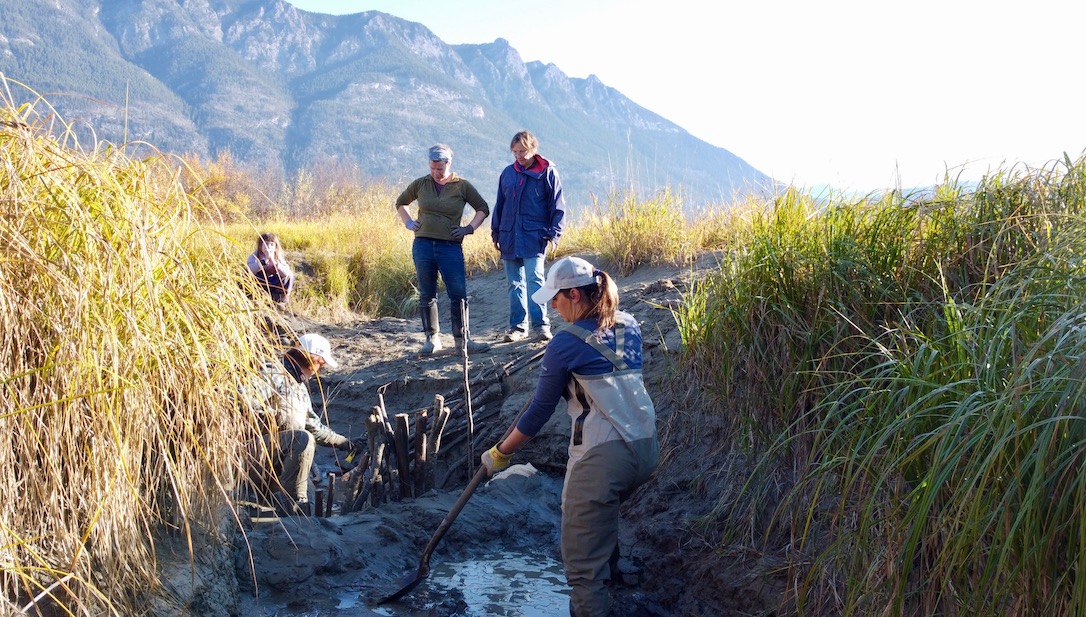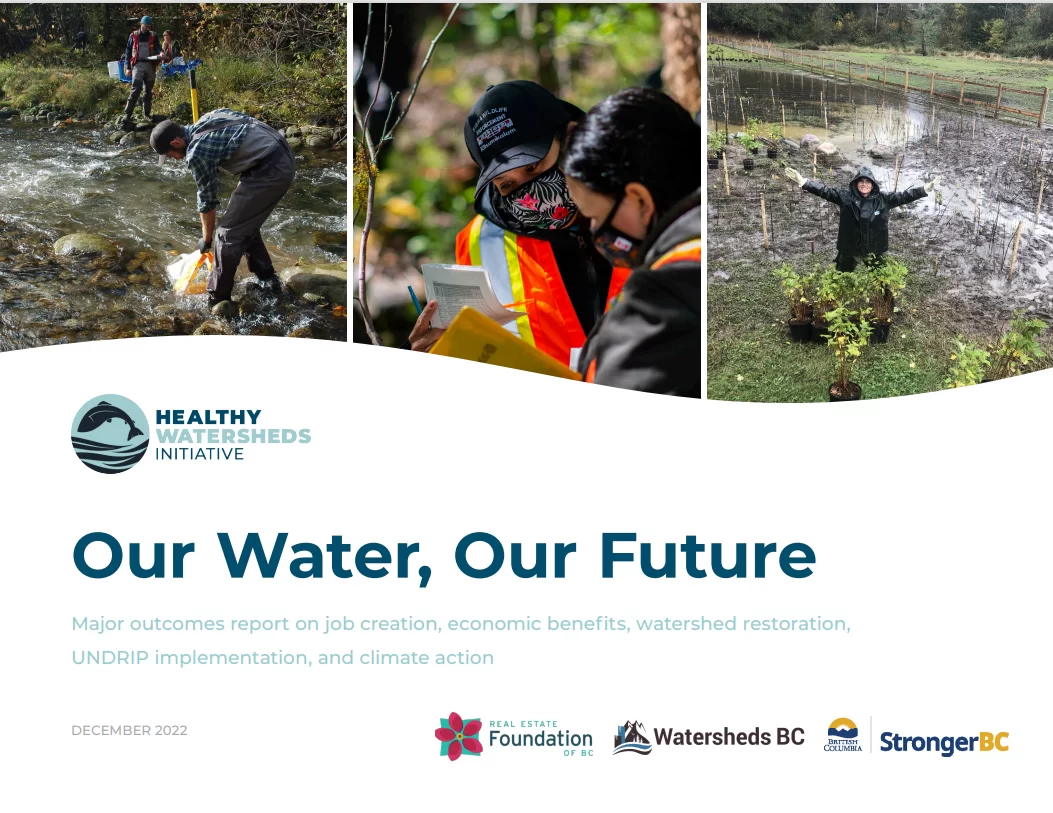

Watershed restoration work in the Upper Columbia Basin. Photo: Living Lakes Canada
What’s at Stake for Our Fresh Water Systems?
Newly released report highlights the Success and Cost-Effectiveness of Investing in Community-led Watershed Restoration and Stewardship Work
Vancouver, xʷməθkʷəy̓əm (Musqueam Indian Band), Sḵwx̱wú7mesh (Squamish Nation), and səlilwətaɬ (Tsleil-Waututh Nation) — In its newly released Major Outcomes Report, Our Water, Our Future, the Healthy Watersheds Initiative (HWI) documents the successes and challenges of one of the most significant investments in watershed conservation and restoration in British Columbia during the coronavirus pandemic of 2021 and 2022.
Over the past 24 months, more than 60 projects – spanning thousands of sites within the province’s eight major drainage basins – restored riparian and wetland habitats, created spawning grounds for salmon, and built habitat and community resiliency to withstand sea level rise and climate change events. In the process, they created jobs and training for more than 1200 people, with a focus on Indigenous people, women, and youth.
“We are deeply grateful to all the project teams whose work and insights made it possible for us to see and understand roles, responsibilities, and actions that are critical to UNDRIP commitments, economic recovery, climate action, and community and watershed health,” said Leanne Sexsmith and Zita Botelho, Co-Directors of the Healthy Watersheds Initiative. “We are thankful to our Indigenous Leaders Advisory Circle, the B.C. government and community partners for working with us to guide, implement, and share in this work, which has resulted in incredible learning, impacts, and returns from one of the most significant investments in water security in decades.”
Project teams also reported strong spinoff benefits for local contractors, service providers, and businesses – generating high returns on investment overall. Cross-sector economic benefits were cited for fisheries, forestry, agriculture, mining, and recreation. Municipal and provincial cost savings – through increased climate resilience, improved water quality and supply, and social, cultural, and health benefits – were also identified.
Restoring Watersheds & Strengthening Natural Defences against Climate Change | Ministers Celebrate the Work
Communities throughout British Columbia are adapting to climate change, protecting drinking water, restoring critical habitat, bolstering local economies, and demonstrating a path forward for shared leadership between Indigenous and non-Indigenous communities through outcomes of the HWI.
As global warming accelerates – resulting in record droughts, wildfires, and flooding disasters – actions taken to conserve and renew watersheds are essential. HWI projects demonstrate a strong path forward for investing in nature-based infrastructure, planning and monitoring that builds community resilience and safety at a fraction of the cost of recovery efforts after extreme climate events.
“Healthy watersheds are critically important for climate adaptation since they can reduce the impacts of floods, droughts and wildfires,” said Nathan Cullen, Minister of Water, Land and Resource Stewardship. “My congratulations to the Healthy Watersheds Initiative and the 60-plus projects that worked through incredibly challenging times to create local jobs, improve community resilience and build a stronger B.C. for the future.”
The restoration of riparian and wetland habitats through HWI projects helped protect important species, increase biodiversity, manage peak water flows and summer droughts, and supported habitat and community resiliency. Work included removing physical barriers to migrating salmon, planting vegetation, building infrastructure, and investing in data collection and monitoring. It also included contributions to longer-term watershed and species sustainability plans.
“Maintaining and protecting healthy watersheds and wetlands are among nature’s strongest barriers against climate change – and will help sustain healthy ecosystems and healthy communities for future generations,” said George Heyman, Minister of Environment and Climate Change Strategy. “The Healthy Watersheds Initiative helps fund local projects that rehabilitate threatened watersheds and wetlands, restoring these critical habitats so they are healthier and more resilient to climate change.”
Advancing Important Commitments to UNDRIP
The report also emphasizes the complex, challenging, and important areas of learning that project teams undertook as they advanced the United Nations Declaration on the Rights of Indigenous People (UNDRIP) through their work. With the majority of projects supporting the exercise of Indigenous rights and incorporating Indigenous knowledge in planning, they are advancing important commitments to UNDRIP and providing inspiring examples of what is possible through strong investments in watershed conservation and restoration, community leadership, and relationship building.
“Water is critical for us, for all of us. For myself, as an Indigenous person, it takes me back to my roots, my origin,” said Mavis Underwood, Chair of the Healthy Watersheds Initiative Indigenous Leaders Advisory Circle and Governor for the Real Estate Foundation of BC. “We have a destiny that was here in the hearts and minds of people before us, generations before us that connect us back to the land and the water. Indigenous law in most cases describes a relationship of gratitude, respect and responsibility for air, land, water, and species that are gifts through creation to help sustain all life. It is exciting to see the outcomes from the work of the project teams and it is inspiring to see young people who are leading the way and are making a difference in their watersheds.”
The work completed through the HWI demonstrates the success and cost-effectiveness of working in partnership to resource and bring communities together to improve local watershed security. Overall, the report amplifies the extraordinary co-benefits of the work for ecosystems, economies, community health, and well-being.
The HWI projects were supported through a $27 million investment from StrongerBC – a $10 billion COVID-19 economic recovery plan. To deliver the funding, the Province partnered with the Real Estate Foundation of BC (REFBC), who administered the Healthy Watersheds Initiative (HWI), in partnership with Watersheds BC.

Healthy Watershed Initiative Project Examples
Quatse (Gwa’dzi) Estuary Restoration
One of the HWI projects focused on restoring coastal processes and improving fish and wildlife habitat in the Gwa’dzi River Estuary. This project was implemented and delivered in partnership with the Kwakiutl First Nation, The Nature Trust of BC along with all levels of government. The project work focused on enhancing fish and wildlife habitat while ensuring the estuary would be resilient to sea-level rise and climate change.
“We are very appreciative of our work with Nature Trust and the flexibility of this funding to allow us to focus on species that are culturally and historically significant to Kwakiutl. Support for this type of work is rare, and yet the Indigenous Knowledge and teachings about such things are critical to our survival, our health, and healing.” – Kwakiutl First Nation, Quatse (Gwa’dzi) Estuary Restoration
Chilako River Restoration Demonstration Project
HWI jobs and training contributed to leadership development, advanced career goals, connected people to community and culture, and supported intergenerational engagement and knowledge sharing. Through the HWI, the Upper Fraser Fisheries Conservation Alliance (UFFCA) restored riparian and floodplain ecosystems along the Chilako River and supported 27 jobs. The UFFCA partnered with Lheidli T’enneh and Saik’uz First Nations to complete this work. The project focused on revitalizing spawning habitats, reducing erosion, and minimizing the effects of climate and land use changes.
“While our team of fish technicians brings a vast area of skills and experiences, it is safe to say that everyone was in search of meaningful employment where a strengthened relationship to the land and a work environment that improves their health were welcomed. Sharing knowledge of the rapidly declining salmon stocks in the watershed and explaining how the problem we are dealing with is largely the outcome of a 100yr old land use decision helps build empathy for the work that needs to be done to rebuild the dynamic floodplain process that creates rearing and spawning habitat in preparation for salmon recovery.” – Upper Fraser Fisheries Conservation Alliance and Lheidli T’enneh First Nation, Chilako River Restoration Demonstration Project
-30-
Photos for Media Use: Dropbox
Contact:
Cheyenne Bergenhenegouwen, Communications Manager, Healthy Watersheds Initiative
(604)-316-7551 | cheyenne@refbc.ca
Learn More:
For a link to the HWI Major Outcomes Report, visit: https://healthywatersheds.ca/news/our-water-our-future-major-outcomes-report/
For more information about projects being supported by the Healthy Watersheds Initiative, visit: https://healthywatersheds.ca/
For more information about how HWI-funded work helped advance UNDRIP implementation and supported reconciliation, visit: United Nations Declaration on the Rights of Indigenous People: Healthy Watersheds Initiative Evaluation Framework and Report
The Healthy Watersheds Initiative is administered by the Real Estate Foundation of BC in partnership with Watersheds BC to support the successful implementation of more than 60 watershed security projects in communities across the province. Learn More: https://healthywatersheds.ca/
The Real Estate Foundation of BC (REFBC) is a philanthropic organization working to advance sustainable, equitable, and socially just land use and real estate practices across BC. Since 1988, REFBC has granted over $100 million to organizations working to strengthen communities, protect our shared land and water, and advance sustainable real estate practices. Learn More: https://refbc.com
Watersheds BC is a capacity-building initiative supporting local watershed governance and security. Watersheds BC provides training, resources, and peer-to-peer support to local government staff, First Nations, watershed boards and roundtables, regional and provincial staff, and other watershed professionals. Learn More: https://www.watershedsbc.ca
The Province of BC has invested $37 million (including $27 million through the Healthy Watersheds Initiative) for projects that support healthy watersheds, species, and ecosystems, and create new jobs in areas that are critical to help communities adapt to the effects of climate change. This funding is part of the Province’s $10-billion COVID-19 response to help people in hard-hit industries. Learn More: https://strongerbc.gov.bc.ca
SHARE